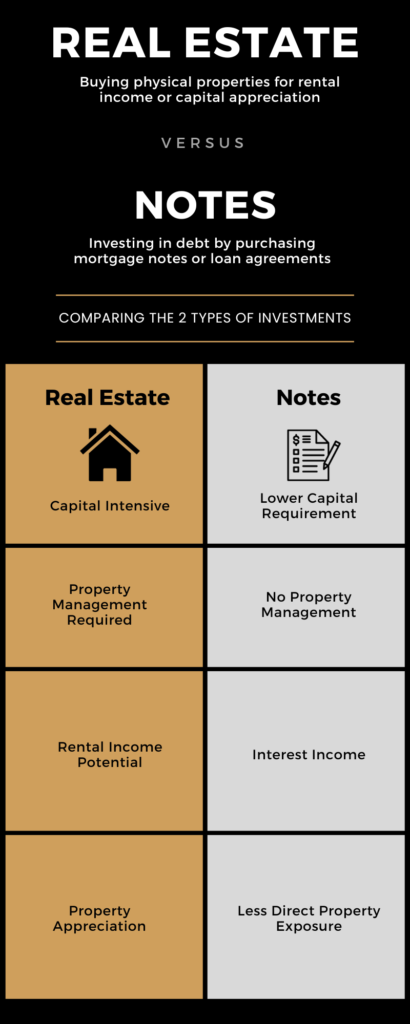The real estate investing vs note investing debate. Which type of investing will generate the best results? Well, it depends. But, we, of course, prefer notes. If you are a traditional real estate investor, you can see the benefits of adding mortgage notes to your portfolio.
Let’s get a few definitions out the way first.
A mortgage note is created when a borrower signs a promissory note to get a loan. It’s simply an IOU to pay back to someone else. A mortgage or deed of trust collateralizes the property as security with the note. In other words, it allows a lender to be able to take the property back from a borrower if the loan is not paid in full.
With note investment, you are buying promissory notes at a discount for profit. You can also create notes to sell in the open market.
Sticks & Bricks Vs Mortgage Notes

As a real estate investor, you are the landlord, the rehabber, the wholesaler, etc. Real estate investors generally are the owners of the properties. This makes you responsible for locating tenants, property repairs, maintenance, upgrades, taxes, and everything else that goes along with ownership.
Real estate investing can be as active or passive as you wish. You always have to be on the hunt for new deals. Having deep pockets and money for marketing is essential. With mortgage note investing, there is much less marketing involved.
No more putting up “We buy houses” signs all over town. Notes can be purchased from hedge funds, lending institutions, or online trading platforms. More marketing is involved if searching for notes available directly from owner financed sellers like on Craigslist.
Also, with real estate investing you have to make many offers just to get one deal an most offers will not be accepted.
In addition, locating financing for deals either from banks or private/hard lenders is a pain. One must meet lending criteria to obtain funding. With mortgage notes, it is easier to find money via joint ventures and hypothecation deals (using a note as collateral to borrow money from another investor/lender). No credit checks needed!
Tenants, trash, termites, and toilets are bane of every owner of traditional real estate. Renters likely do not care about your property. With notes, most borrowers are very motivated to remain in their homes. They are likely to figure out ways to pay you to stay versus your average renter.
Real estate investors get paid last. Other vendors, property managers, realtors, attorneys…basically everyone gets paid first. Not to mention the costs of property ownership associated with being a landlord, taxes, utilities, and mortgage payments.
Note investors/lenders are the first to get paid if a borrower sells a property or goes into foreclosure. There are also minimal costs associated with maintaining a note…legal fees and nominal servicing fees.
Remember – as note investor you are the bank. Like any bank, you simply lend the money and reap the returns. With mortgage note investing, you get the cashflow without the hassles of ownership.
Want quick cash? You can also flip a note to another investor like you would a property – but with much less hassle.
In general, mortgage note investing has predictable outcomes – either the borrower pays as agreed, pays off early, or does not pay back the loan.
Transitioning to Note Investing
A word of advice to make the switch easier….think like a lender! WWBD – What would a bank do?
They would not take on risky deals. They would focus on return or yield – getting the maximum amount of money they can out of a deal.
Own Both Notes & Traditional Real Estate

We think it is smart to own both notes and property. Despite some of the hassles of traditional real estate investing there is one major positive. A big downside of note investing is that it is not as tax advantageous as owning real estate.
There is no depreciation and less tax deductions. Now, you can invest in notes using an individual retirement account (IRA), health savings account (HSA), or certain types of 401Ks to get around this somewhat.
Nonetheless, combining notes and property ownership can be a fabulous way to jump your start path to wealth generation.
You May Also Want to See:
- CFD vs. Mortgage/Deed of Trust – What’s the Difference?
- Unlocking Cash Flow: Harness Mortgage Note Investing and Be Your Own Bank
- Demystifying Mortgage Note Investing: How to Get Started Now!
- 8 Ways to Make Money with Real Estate Note Investing
- Top 3 Reasons Why Note Investing Is the Future of Investing
